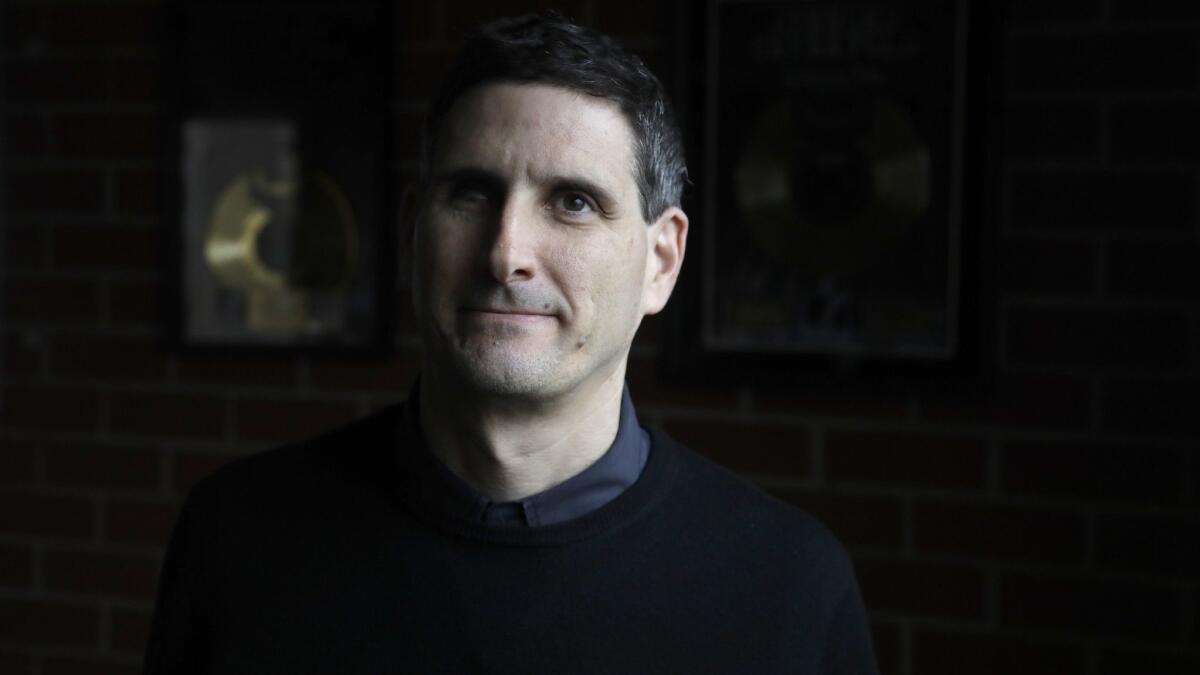How Hopeless Records has thrived for a quarter century in indie punk

- Share via
A few days before the L.A. independent punk label Hopeless Records is set to celebrate its 25th anniversary, a deluge of rain hit L.A. and flooded the streets around its Van Nuys headquarters. The water rose calf-high in the gutters around the building, making it near-impossible to enter or exit without getting soaked.
But inside, label founder Louis Posen took a soggy visitor for a tour around the complex. Despite being legally blind due to retinitis pigmentosa, Posen knew every inch of the place by feel. He introduced the label’s head of A&R and the newest crop of college-age interns, and showed off conference rooms decked out in gold record plaques and the warehouse where it stashed the latest vinyl pressings.
Every label has had to navigate a flood of tech-driven ruptures in the music industry, which broke its century-old business model in just a decade. But few small labels have done so better than Hopeless, which has thrived in its niche of underground punk and metal since its founding.
Posen did it by embracing technological shifts while letting genre trends wash on by. As he looks back on 25 years in business and millions of records sold, his little punk label has ridden out the storms in time to see its founding ideas — emotive outsider music driven by tech-savvy teens — reshape the music biz yet again.
“The community was why I got into this kind of music when I was 16 years old,” Posen said. “You realize this is about more than just good songs. This is about the people you’re experiencing it with, that you’re part of something special together. Those sounds have changed over time, but the community hasn’t. You share this music with your friends, music that other people aren’t into, and it makes you different.”
In some ways, the modern record business sort of resembles the DIY world of 1993, when Posen founded the label in the San Fernando Valley with just a thousand bucks and a battered book on the indie label business. It’s just all sped up exponentially.
Back then, fans discovered this music on cheap label-sampler CDs and, later, on early social media like MySpace that drove the emo-rock boom. Bands like Dillinger Four, Guttermouth and 88 Fingers Louie (all of which are playing the label’s anniversary party at the Regent Theater on Saturday) weren’t mainstream by any means. But bands like Green Day and Rancid proved there was a huge nationwide audience for scrappy little punk acts.
Now Warped Tour is gone and Spotify playlists reign. But there’s still something resilient in young people finding underground music that creates a tribal loyalty. That’s still true in the fire-hose of content in the streaming era.
“We’re a part of something where our fans do a lot of the marketing for us. They’re telling their friends and their friends are telling their friends,” Posen said. “Does it have a ceiling to it more so than mainstream music? It does. But that doesn’t mean it can’t be a career for many of these artists.”
The artists agree. “Louis himself is unlike other label owners,” said Andrew McGuire, guitarist for the rising Hopeless-signed metal band Afterlife. “He’s in the office every time we’ve ever visited, working alongside everyone. He started out to help out a friend’s band, and then 25 years later, he’s still doing just that but on a much bigger level.”
For a stretch in the mid-2000s, Hopeless did have several mainstream hits. From the pop-savvy emo of All Time Low to the metalcore of Avenged Sevenfold, Hopeless has gold albums and plenty of charting singles in its catalog. Posen says such feats are more difficult now (best of luck trying to hit Drake numbers with a rock band in 2019).
“It can be challenging going to partners now because the big numbers come from hip-hop and pop,” Posen said. “It looks like rock is not strong. But millions and millions of streams is not nobody caring about this music.”
Posen thinks his corner of the indie business might have actually gotten more stable with streaming, even if an underground rock act is less likely to break massively.
“Our job was to adapt to those changes and not get caught asleep at the wheel,” he said. “Our view of it was ‘This is the next thing that’s coming, so let’s get in the door.’ I remember being the first independent label to sit down at the Spotify office in New York when they opened up. We’ve always embraced any new technology or any direction the industry is going because we’re not big enough to fight it, so we might as well embrace it.”
Now even veteran bands, like those playing on Saturday, are streaming “tens of thousands of times a week,” Posen added. Younger acts, like the Welsh combo Neck Deep, do tens of millions of streams — not hip-hop smash numbers, but more than enough for a sustainable career. And a new crop of rappers is drawing from the early-2000s emo and punk that Hopeless helped popularize.
“I think Hopeless has adapted very well to the streaming shift,” McGuire said. “Their radio and streaming team has very good relations with all the major players, and their help and expertise have really assisted propelling their acts.”
Posen’s never seen his disability as a hindrance in running the label. “I can’t A/B test it, obviously,” he said, “But I think it’s actually been an advantage for me. Maybe that’s just my own optimistic way of looking at things. But my experience has positives and negatives, and on the whole it’s been an important part of what value can I bring to the team.”
That sense of empathy has helped guide the label, with its Sub City imprint and charity tours raising several millions of dollars over the years, largely for mental health and suicide-prevention groups (one recent fundraiser had Hopeless bands covering songs that got them through difficult times).
With a new wave of drug abuse and overdose deaths in underground scenes, Hopeless is a model for how fans can use music as a platform to work on social issues. Now more than ever, that might be its biggest achievement.
“Independent music is activism, especially punk rock,” Posen said. “We have to be using resources well and not wasting them; we have to listen to each other. This community is way too small to burn bridges or hurt other people.”
♦ ♦ ♦ ♦ ♦ ♦ ♦ ♦ ♦ ♦
Hopeless Records 25th Anniversary show
When: 6:30 p.m. Saturday
Where: The Regent, 448 S. Main St.
Tickets: $22.50-$30
Info: spacelandpresents.com
For breaking music news, follow @augustbrown on Twitter.
More to Read
The biggest entertainment stories
Get our big stories about Hollywood, film, television, music, arts, culture and more right in your inbox as soon as they publish.
You may occasionally receive promotional content from the Los Angeles Times.











